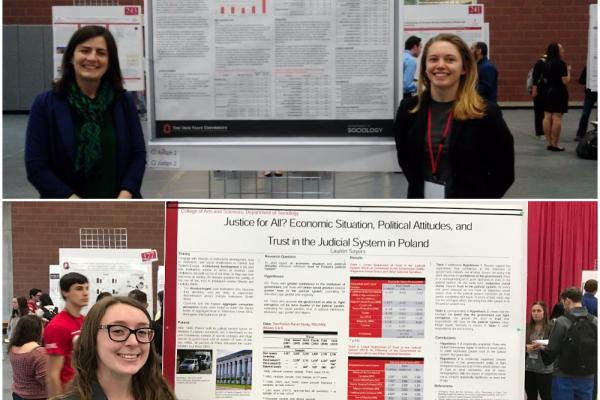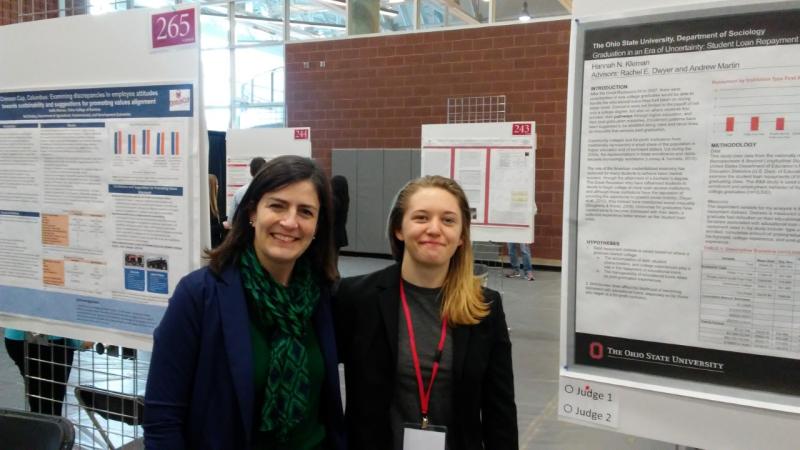Undergraduate Students Present at the 2017 Denman Research Forum

On Wednesday, March 29th 2017, the 22nd annual Richard J. and Martha D. Denman Undergraduate Research Forum was held in the RPAC. The Denman gives undergraduate students an opportunity to showcase their research, scholarship, and creativity. The Sociology Department had three students present their research findings at this year's Denman - these students are Hannah Kleman, Lauren Sayers, and Sunder Sai. Below, the students give a brief description of their research projects. Enjoy!
Hannah Kleman's project was titled "Graduation in an Era of Uncertainty: Student Loan Repayment Following the Great Recession."
"Having taken an unusual pathway through higher education myself, I wanted to better understand what the 'student loan crisis' meant for those who started at non-traditional institutions. My interest in this issue was accompanied by the repairing labor market following the Great Recession, where much discussion has been around if graduates are even able to find work. For this, I used the Baccalaureate & Beyond survey data on the 2007-08 cohort of graduates and examined where bachelor's recipients began college (public four-year, private not for profit four-year, community college, and for-profit). What I found was that those who started at a for-profit school had the most trouble with repayment with greater odds of defaulting on the student loans they accumulated to pay for college than their peers who started elsewhere. This is interesting since I look at graduates, and even though these for-profit respondents have a bachelor's degree, this is not enough to cleanse them of their original disparities. Further, community college students had a similar profile, but had better success with repayment. This distinction is especially crucial, the difference in repayments between for-profit and community college students, under an administration that pushes for the deregulation of the for-profit industry."
Pictured below are Hannah and her faculty advisor, Dr. Rachel Dwyer, at the 2017 Denman Undergraduate Research Forum.

Lauren Sayers presented a project influenced by a study abroad program she participated in. The research project was titled "Justice For All? Economic Situation, Political Attitudes, and Trust in the Judicial System in Poland."
"The main research question of my project is, “To what extent do economic situation and political attitudes influence individual trust in Poland’s judicial system?” I examine this question in the context of Poland. One of the largest countries in Europe, and the largest of the CEE, Poland had a Communist government from the end of World War Two until 1989. Poland continues to experience radical social change: In addition to the upheavals of 1989, and the rush to European Union accession in 2004, the judicial and other governance institutions went through major reforms. Hypothesis 1: Advantaged social classes express greater trust in the judicial system than disadvantaged classes, controlling for age, gender, religion and trust in political institutions. Hypothesis 2: Those with high trust in the judicial system are also likely to have high trust in parliament and political parties, controlling for social class, age, gender and religion. Hypothesis 3: Those who perceive that the government has a positive impact on corruption will be more likely to have high trust in judicial system, controlling for social class, age, gender, religion, and trust in political institutions. Hypothesis 1, that advantaged social classes express greater trust in the judicial system than disadvantaged classes, controlling for age, gender, religion and trust in political institutions, is empirically supported. Hypothesis 2, that those with high trust in the judicial system are also likely to have high trust in parliament and political parties, is also supported. Hypothesis 3 proposes that those who perceive that the government has a positive impact on corruption will be more likely to have a high level of trust in the judicial system, and this, too, is empirically supported.
Below is a picture of Lauren and her project at the 2017 Denman Undergraduate Research Forum.
Sunder Sai presented a project titled "The Relationship Between Responsible Drinking Policies and Football Game-Day Incidents at the Ohio State University: A Preliminary Study."
"For my research study, I looked at the impacts that responsible drinking policies had on game-day incident trends at OSU football games. The incidents that were reported included alcohol/other types of arrests inside and outside the stadium, alcohol citations, and stadium ejections. The trends seemed to be decreasing in the past couple of seasons and the question I asked my self was what could this be attributed to? I hypothesized that “responsible drinking policies” could have an impact. These policies include alcohol sales that started in 2015 as well as the 2016 stadium no-bag policy. The stadium-wide alcohol sales could influence guests to drink moderately inside the stadium. This may discourage the amount of alcohol consumed outside the stadium prior to the game. The new no-bag policy limits guests from bringing in outside alcohol into the stadium.I looked at other factors beyond policy that could be causing the downward trends and tried to see if they could be ruled out. I found that temperature, attendance, and points scored did not appear to have a significant impact on game-day incident trends. Time, however, seemed to have a big impact. The evening games were seen to have the highest incident-rates. I took out the evening games from the data set and compared the trend lines once again. When evening games were taken out, total incidents decreased significantly. However, there is still a downward trend line meaning that there is another factor that is causing this. These responsible drinking policies could be impacting these trends. More research will be conducted for future games.
Dr. Paul Bellair of the Department of Sociology was of great support and guidance for my research. I met with him several times to discuss a variety of project ideas that I had thought of regarding public safety and he helped me narrow my interests. His background and expertise in crime in a community context was very helpful. For this project he reviewed my methods, charts, graphs, and data collection and provided very useful feedback. He challenged me to think critically and even encouraged me to create a bolder project title that would capture people’s attention. It is clear that he is very passionate about teaching and mentoring students. His enthusiasm for my research was very much appreciated and I am so thankful for his help."
Below is a picture of Sunder and his project at the Denman.
Congratulations to our students who presented at the Denman, we are very proud of you!
